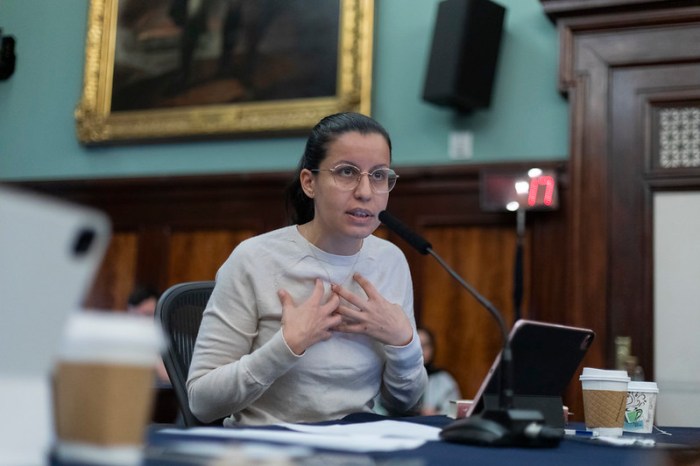
File photo by Emil Cohen/NYC Council Media Unit
Jan. 22, 2025 By Shane O’Brien
Council Member Tiffany Cabán has spoken out against recent proposals by Gov. Kathy Hochul and Mayor Eric Adams to expand involuntary commitment standards for individuals with mental illnesses, a move that has sparked significant debate among disability and mental health advocates.
Gov. Hochul, in her recent State of the State address, called for broader criteria for involuntary commitment, targeting individuals deemed unable to provide or unwilling to accept help with basic needs. The announcement caught many in the disability and mental health communities by surprise, prompting concerns about potential overreach and the impact on vulnerable populations.
Mayor Adams echoed similar sentiments in his Jan. 9 State of the City address, reiterating his ongoing push to reform New York’s involuntary commitment standards. Adams has been a vocal proponent of expanding the ability of authorities to intervene in cases of severe mental illness, framing the issue as a matter of public safety and individual well-being.
Additionally, the Mayor has issued a statement welcoming Hochul’s support for expanding involuntary commitment standards, stating that he was “exceptionally grateful” to the governor.
“Denying a person life-saving psychiatric care because their mental illness prevents them from recognizing their desperate need for it is an unacceptable abdication of our moral responsibility,” Adams said in a statement. “That is why, two years ago, our administration announced an ambitious plan to support New Yorkers living with untreated severe mental illness and experiencing homelessness.”
Cabán, who represents New York City Council District 22—which encompasses Astoria, East Elmhurst, Rikers Island, and parts of Jackson Heights and Woodside—has been a vocal advocate for community-based mental health solutions. She criticized the proposals, asserting that they risk causing harm by neglecting the root causes of mental health crises. Her opposition highlights a broader, ongoing debate over how New York should tackle mental health challenges while safeguarding individual rights and ensuring public safety.
Cabán described involuntary commitment as an “inappropriate” medical response for the vast majority of individuals living with mental illnesses. “There are many more effective, less coercive, less intrusive, and less violent medical interventions that would serve the majority of those in need,” she stated.
She also highlighted concerns raised by the Coalition for the Homeless, which has criticized involuntary commitment for its disproportionate impact on low-income communities. According to the coalition, the policy primarily “forcibly removes low-income people with mental health issues from their communities, rather than serving mental health needs in any detectable way.”
She called for “Housing First” approaches to mental health, stating that supportive housing, referring to apartments designed to support those who need psychiatric or substance use treatment, are proven to reduce homelessness and support individuals with severe mental illnesses.
Cabán pointed to a recent investigation by THE CITY, which found that there were nearly 1,000 on waitlists for supportive housing but that only 18% of applicants obtained accommodation. Cabán said there are thousands of vacant units across the city and said the vacant units can help provide a solution to the city’s mental health crisis.
“New York City must fill these vacant units, as well as expand supportive housing eligibility criteria and increase the number of supportive housing units available to New Yorkers,” Cabán said.
“We currently also have astronomically long wait lists for IMT and FACT teams (mental health care teams that provide outreach to individuals in shelters, in the streets, and at home). These programs must be expanded.”
Cabán urged on both Adams and Hochul to focus on fully funding and scaling non-coercive resources for people living with mental illness. She said involuntary commitment should only be used when it is deemed necessary by healthcare professionals for a person with severe mental illness.
Cabán’s remarks underscore a broader debate over how New York can effectively address mental health challenges while balancing individual rights and public safety.
8 Comments

Fully agree with Anon and others. Cabán is a flip-flop just waiting to turn salmon and go against the current just to get attention. She has failed at her position as Council and no matter how hard i tried to unseat her at the polls, her sheep deserve the wolves.
Can she be impeached already or at least lose her driver’s license for repeatedly speeding in school zones?
Hey, Tiff.
How about opening your office once in a while? Or answering your calls? Or replying to emails? You’re a colossal disappointment.
I am sure that most people living in the low-income communities where a “disproportionate” share of mentally ill people would be removed from the streets would actually be pleased to no longer have to face erratic, often aggressive individuals suffering from mental illness loitering around their homes and local businesses. This politician is putting idealistic personal philosophy over real-world practicality.
If this imbecile is against something, you can be sure the idea has merit.
So stupid. She would change her tune if some lunatic pushed her on the subway tracks. But she probably hasn’t been on the subway in many years.
Tiffany Caban should be committed. She has zero empathy for the victims of violence and has voted to defund the police among other dumb ideas. She does not care that mentally ill people are a threat to themselves as well as others. Please vote her out!
When her office was robbed, she was fast to call the police.